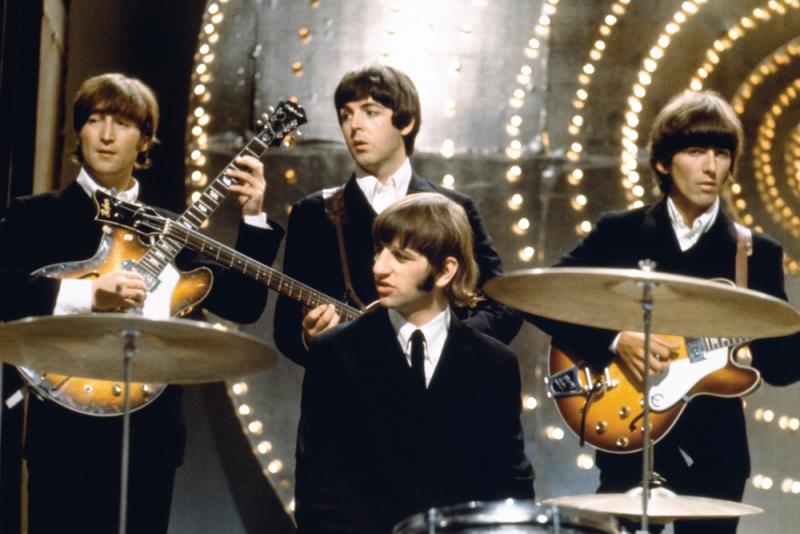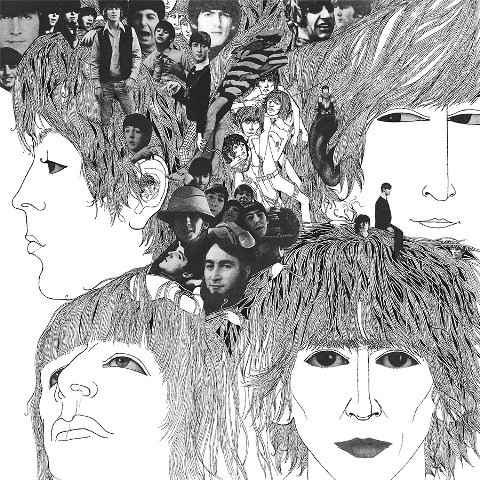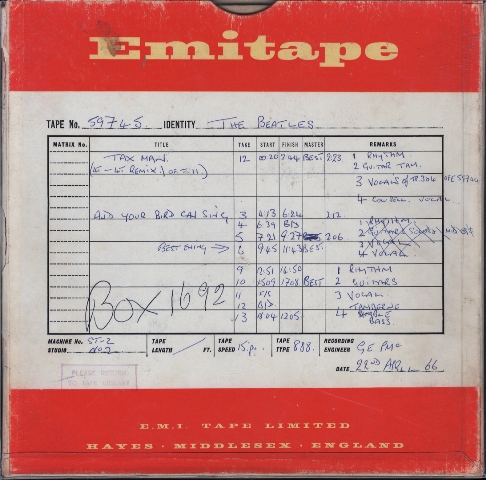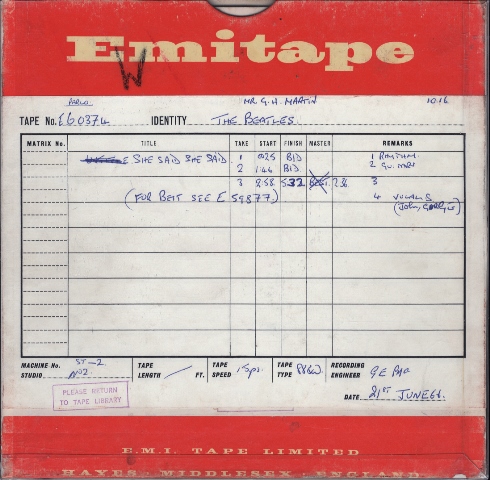Music Reissues Weekly: The Beatles - Revolver | reviews, news & interviews
Music Reissues Weekly: The Beatles - Revolver
Music Reissues Weekly: The Beatles - Revolver
Perception-shifting box set of the Fabs' momentous 1966 album

John Lennon does not appear on “Love You Too” and “For No One”. With “Taxman”, “Eleanor Rigby”, “Here, There and Everywhere”, “Good Day Sunshine” and “I Want to Tell You”, his contributions are limited to backing vocals and, on odd occasions, some percussion too. He appears semi-detached from seven of Revolver’s 14 tracks.
This realisation comes after reading the handsome book accompanying the Revolver box set. The pages with the track-by-track commentary have headings above each section of text, listing dates of recording, the studios used, the personnel and who played what. Leaf through, and there’s the diary of what John was up to. Or not up to.
 In contrast, the sole Beatle on every album track is Paul McCartney. As well as John, George Harrison is also not on “For No One”. His only absence. Unsurprisingly, Ringo Starr isn’t heard on “Eleanor Rigby”. John is Revolver’s least-evident Beatle.
In contrast, the sole Beatle on every album track is Paul McCartney. As well as John, George Harrison is also not on “For No One”. His only absence. Unsurprisingly, Ringo Starr isn’t heard on “Eleanor Rigby”. John is Revolver’s least-evident Beatle.
Contrast that with a previously unheard, riveting first run through of George’s “Love You Too”. He plays acoustic guitar, while Paul adds harmonies filling out the melody. As the takes mount up, Ringo adds a tambourine and the familiar recording emerges. Paul is with it all from the off.
There is a counterbalance, with John cast as the album’s trailblazer. The first Revolver track recorded was his “Tomorrow Never Knows”, a dive into new, uncharted territory. He set the tone with that and, to lesser degrees, “She Said She Said” and “Rain” (recorded during the album sessions and destined to became the B-side of “Paperback Writer”). But although Paul’s “Eleanor Rigby” was a different type of thing, it was as ground-breaking as “Tomorrow Never Knows”. Then there’s George’s “Love You Too”. John was not the only innovator.
Most of this was unknown when Revolver was issued in August 1966 and, until now, has never been so boldly apparent. Cumulative snapshots revealing whose hands seem most constant on the Beatles tiller prefigure Paul’s later, and easier to see, prominence: with the Sgt Pepper’s concept, with Magical Mystery Tour, with what became Get Back and Let It Be.
 Of course the Revolver box set isn’t necessarily about discerning where an ostensible dominance lay. Nonetheless, it’s impossible not to ponder what’s presented and head towards some conclusions. (pictured left, box for the original four-track tape of the “Tax Man” and "And Your Bird Can Sing" sessions © Calderstone Productions Ltd)
Of course the Revolver box set isn’t necessarily about discerning where an ostensible dominance lay. Nonetheless, it’s impossible not to ponder what’s presented and head towards some conclusions. (pictured left, box for the original four-track tape of the “Tax Man” and "And Your Bird Can Sing" sessions © Calderstone Productions Ltd)
Digging into the nuts and bolts of what made the monumental Revolver what it is is enhanced by frequently mind-boggling session and demo tracks which have never been heard before (a few cuts had their first outing on Anthology 2 in 1996). The treats keep coming.
There’s take five of “Rain”, played as is: before being slowed down for the released version. It’s super-fast. Ringo’s drumming is amazing. Hearing it is jarring. The first songwriting demo of “Yellow Submarine”, recorded at John's home, has these lyrics: “In the town where I was born, no one cared, no one cared.” It’s gloomy, with an atmosphere akin to the opening section of “Strawberry Fields Forever”. A second “Submarine” songwriting demo with Paul on board is catchy and cheery, pointing towards the fun track which was issued. Lennon’s desolation was abandoned.
 But this box set is not just about helping reinterpret the past. There’s a new Giles Martin stereo mix of the album, and of “Paperback Writer” and “Rain” too. They're made with what’s been termed “demixing”: each track of the original four-track tapes had multiple instruments or voices and artificial intelligence technology has extracted single elements to make new building blocks to work from. The purpose is to overhaul The Beatles recordings to stand alongside modern material on streaming services. Setting views on this monkeying aside, the new stereo version is not markedly different to the original album: it’s more present, has more separation and an added punchiness. Not earth-shaking, not a moustache on the Mona Lisa either. The world would keep turning without it. As well as this, the set includes a new remaster of the original 1966 mono album which sounds great, very in-the-room immediate. It’s this mix which The Beatles and George Martin had invested most time in. So if the contemporaneous is needed, head here. (pictured right, box for the original four-track tape of the “She Said She Said” sessions © Calderstone Productions Ltd)
But this box set is not just about helping reinterpret the past. There’s a new Giles Martin stereo mix of the album, and of “Paperback Writer” and “Rain” too. They're made with what’s been termed “demixing”: each track of the original four-track tapes had multiple instruments or voices and artificial intelligence technology has extracted single elements to make new building blocks to work from. The purpose is to overhaul The Beatles recordings to stand alongside modern material on streaming services. Setting views on this monkeying aside, the new stereo version is not markedly different to the original album: it’s more present, has more separation and an added punchiness. Not earth-shaking, not a moustache on the Mona Lisa either. The world would keep turning without it. As well as this, the set includes a new remaster of the original 1966 mono album which sounds great, very in-the-room immediate. It’s this mix which The Beatles and George Martin had invested most time in. So if the contemporaneous is needed, head here. (pictured right, box for the original four-track tape of the “She Said She Said” sessions © Calderstone Productions Ltd)
All this comes in a lovely package. The thoroughly illustrated, LP-sized, casebound book slots into a slipcase along with a similarly dimensioned foldout wallet with five CDs: the remixed album, the mono original, two discs of the demos and session tracks and a fifth of new stereo versions of “Paperback Writer” and “Rain”, plus their original mono counterparts which were on single. The text in the book is essential reading. Like what’s heard, it says tons which has never been said before.
This doorstop-like rendering of one of the greatest musical landmarks by the 20th-century’s most bracing musical phenomenon could be seen as overkill as The Beatles are endlessly remarketed, endlessly repackaged, endlessly raked over. Any such qualms vaporise as the Revolver box set is as perception-shifting as the original album; as much so as anything The Beatles themselves – including the semi-detached John Lennon – were experiencing around the time of its creation. An important, essential release.
- Next week: 4 EPs - the first four EPs by Ride are collected on a double album
- More reissue reviews on theartsdesk
- Kieron Tyler’s website
Share this article
Add comment
The future of Arts Journalism
You can stop theartsdesk.com closing!
We urgently need financing to survive. Our fundraising drive has thus far raised £49,000 but we need to reach £100,000 or we will be forced to close. Please contribute here: https://gofund.me/c3f6033d
And if you can forward this information to anyone who might assist, we’d be grateful.

Subscribe to theartsdesk.com
Thank you for continuing to read our work on theartsdesk.com. For unlimited access to every article in its entirety, including our archive of more than 15,000 pieces, we're asking for £5 per month or £40 per year. We feel it's a very good deal, and hope you do too.
To take a subscription now simply click here.
And if you're looking for that extra gift for a friend or family member, why not treat them to a theartsdesk.com gift subscription?
more New music
 Album: Baxter Dury - Allbarone
The don diversifies into disco
Album: Baxter Dury - Allbarone
The don diversifies into disco
 Album: Yasmine Hamdan - I Remember I Forget بنسى وبتذكر
Paris-based Lebanese electronica stylist reacts to current-day world affairs
Album: Yasmine Hamdan - I Remember I Forget بنسى وبتذكر
Paris-based Lebanese electronica stylist reacts to current-day world affairs
 theartsdesk on Vinyl 92: Marianne Faithful, Crayola Lectern, UK Subs, Black Lips, Stax, Dennis Bovell and more
The biggest, best record reviews in the known universe
theartsdesk on Vinyl 92: Marianne Faithful, Crayola Lectern, UK Subs, Black Lips, Stax, Dennis Bovell and more
The biggest, best record reviews in the known universe
 Blondshell, Queen Margaret Union, Glasgow review - woozy rock with an air of nonchalance
The singer's set dripped with cool, if not always individuality
Blondshell, Queen Margaret Union, Glasgow review - woozy rock with an air of nonchalance
The singer's set dripped with cool, if not always individuality
 Music Reissues Weekly: Chiswick Records 1975-1982 - Seven Years at 45 RPM
Triple-album 50th-anniversary celebration of the mould-breaking British independent label
Music Reissues Weekly: Chiswick Records 1975-1982 - Seven Years at 45 RPM
Triple-album 50th-anniversary celebration of the mould-breaking British independent label
 Album: Josh Ritter - I Believe in You, My Honeydew
The alt-country singer's latest isn't consistent but does hit highs
Album: Josh Ritter - I Believe in You, My Honeydew
The alt-country singer's latest isn't consistent but does hit highs
 Album: David Byrne - Who is the Sky?
Born to be weird
Album: David Byrne - Who is the Sky?
Born to be weird
 Edinburgh Psych Fest 2025 review - eclectic and experimental
Underground gems and established acts in this multi-genre, multi-venue day long festival
Edinburgh Psych Fest 2025 review - eclectic and experimental
Underground gems and established acts in this multi-genre, multi-venue day long festival
 Album: Faithless - Champion Sound
Three decades into their career the perennial dance duo nail a lengthy but likeable set
Album: Faithless - Champion Sound
Three decades into their career the perennial dance duo nail a lengthy but likeable set
 Album: Saint Etienne - International
British pop institution’s final communiqué is an unalloyed winner
Album: Saint Etienne - International
British pop institution’s final communiqué is an unalloyed winner

Comments
No mention of the immersive